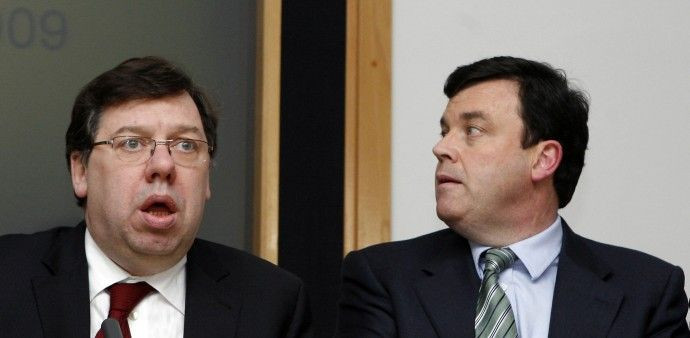What are Ireland's chances of avoiding Greece-style bailout?

Ireland's grip on the slippery debt-mired track is giving way fast as bond yields widened to a level with Greece’s before Athens went broke and was bailed out, fueling speculation that the country could be soon looking for international financial assistance.
The euro was down on Friday 0.3 percent against the U.S. dollar as markets factored in the rising chances of Ireland following Greece's bailout last spring.
Analysts say the chances of an Irish bailout rose as yields went above the rates at which the country might receive funds from the European Financial Stability Facility (EFSF).
A Reuters poll this week showed two thirds of economists and bond strategists polled thought Ireland was on way to seeking a bailout before the end of next year.
The question now is whether there is anything that the government can do to restore confidence, says Capital Economics economist Jonathan Loynes.
One hope is that confidence in Ireland’s fiscal outlook will improve if and when the Government reaches agreement with the opposition party on its austerity plans ahead of the Budget on 7th December, he wrote in a note.
An agreement on the fiscal front is expected to ease worries over the government’s wafer-thin majority and associated doubts over whether the plans to implement the budget squeeze would be successful.
The erstwhile ‘Celtic Tiger’, which has so far committed almost 20 percent of its GDP to supporting the financial sector, is expected this month to detail its plan to cut 15 billion euros in spending between 2011 and 2014.
However, the analyst notes that last week's general announcement that the government was doubling the size of the planned fiscal squeeze had provided little relief, suggesting that even a drastic action on budget might not be helpful.
Besides such a move also has its downsides and might complicate a vicious cycle of developments. ... the markets may reasonably fear that more fiscal tightening - even supported by all parties - will simply hit the beleaguered economy even harder, further damaging the public finances, added Loynes.
Ireland could also look forward to brisker bond buying by the European Central Bank (ECB), which has already bought €711m of mostly Irish bonds last week. But that is less than 1% percent of the Irish bond market and we doubt that the ECB will raise its purchases to levels which would have a real impact on market prices, wrote Loynes.
So that could mean Ireland could turn to the EFSF sooner rather than later, although that in itself is not enormously harmful. Loynes says what must be worrying Ireland more is the still precarious sovereign position of Greece months after the bailout.
Support or no support, Ireland’s problems are far from over.
Ireland could also look forward to help in the form of more clarity regarding the “permanent crisis resolution mechanism” for debt-hit European Union countries, which was agreed in theory last month.
European Union (EU) leaders buried differences late last month to back a Franco-German proposal seeking amendments to the Lisbon Treaty, setting off the process of creating a permanent crisis safety net.
This new measure would replace a $611-billion emergency bailout fund for debt-hit euro zone members, which is due to expire in 2013. A blueprint of the new plan is expected in December.
Loynes says though things are worsening for Ireland, turning to EFSF in the coming weeks or even months is not a certainty.
Admittedly, Ireland reportedly has enough funds to last it until next summer. But should yields continue to rise, the pressure will surely mount for it to seek help well before then.
© Copyright IBTimes 2025. All rights reserved.





















